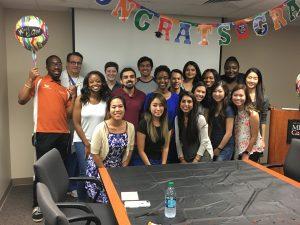Experiential Education Experiences

IPPEs and APPEs occur in healthcare partner facilities in five regions across Texas. Students are assigned in their first year to one of five Texas regions:
- Austin / Temple / Waco (ATW)
- Dallas / Fort Worth (DFW)
- Galveston / Houston (GHO)
- San Antonio (SA)
- Rio Grande Valley (RGV) (Available upon request)
Some APPEs may occur in other states of the U.S., such as at pharmaceutical companies in New Jersey or Massachusetts, at the Indian Health Service (IHS) in Oklahoma or Alaska, the Food and Drug Administration in the Washington D.C. area, and others.
Introductory Pharmacy Practice Experiences (IPPEs)
The University of Texas at Austin College of Pharmacy provides many different opportunities for students to obtain real world experience in their first three years of pharmacy school. These fall under the umbrella of Introductory Pharmacy Practice Experience (IPPE). We offer experience in a variety of settings including community, hospital, and ambulatory.
We also foster community service within our IPPE program with opportunities to serve patients in our communities through screenings, informational programs and immunization clinics. We are always looking for opportunities for our students to experience all aspects of the practice of pharmacy. Below are our main components of the IPPE program.
Public Health Community Service (P1, P2, & P3)
As a part of our Foundations of Professional Development (FPD) course series, students complete a minimum of two hours of community service per semester related to public health, precepted by a healthcare professional or pharmacist preceptor. This starts in their P1 year and encourages our future pharmacists to think about serving their community in ways that may be outside of their formal practice.
Patient Counseling (P2)
Our students, under the guidance of faculty members, provide medication counseling in community pharmacies. They are able to put their training to use and assist patients by providing critical information on their prescriptions. They can address any questions or concerns from patients and use this to inform their knowledge.
Non-Prescription and Self Care (P2)
Students assist patients with selection of over-the-counter (OTC) medications, supplements, and other medical items at community pharmacies.
Institutional (Health-System) (Summer between P2 and P3 year)
Students learn about and participate in the day-to-day operations of a health-system pharmacist. They may rotate through different aspects of the health-system pharmacist experience and learn the fundamentals of pharmacy practice in the hospital setting. Under the supervision of a preceptor, students participate in medication order processing, demonstrate basic use of a unit dose system and intravenous admixture system, articulate current institutional pharmacy standards of practice, and participate in a medication safety exercise, among other activities. This rotation occurs during the summer between the P2 and P3 years.
Community (P3)
At the end of this IPPE, students will earn their APhA MTM certificate. Students participate in the day-to-day operations of a community pharmacist. The community-based IPPE is a longitudinal experience that takes place in either the fall semester or the spring semester of the P3 year. It occurs in both a traditional community pharmacy and an ambulatory setting. Within the community setting, students participate in a variety of activities to prepare them for the community pharmacy APPE, and also achieve Medication Therapy Management certification through APhA. Students are also introduced to pharmacy practice in an ambulatory setting, providing them with an overview of services in a practice environment outside of community and hospital sites.
Ambulatory (P3)
Our newest offering provides students the opportunity to experience the practice of pharmacy in a patient-centric setting. We offer various options for this experience, including traditional ambulatory care, anticoagulation clinics, MTM-based services, and more.
At the end of their P3 year, students will have completed over 300 hours of Introductory Pharmacy Practice Experience. These will help guide students in the selection of P4 rotations, career inquiries, and provide a base for their future pharmacy learning.
Advanced Pharmacy Practice Experiences (APPEs)
Advanced Pharmacy Practice Experiences (APPEs) occur in the fourth year of the Pharm.D. curriculum (P4) and place our students into the practice of pharmacy. Students must complete seven 6-week APPE rotations. Students are required to complete a minimum of 250 hours per rotation, totaling 1750 hours at the end of APPEs.
Experiential Learning Faculty in each region oversee the rotations, preceptors, and other opportunities in each area. They work closely with preceptors and sites to provide a variety of learning experiences to our students. Each student will complete four core required rotations:
- Advanced Community
- Advanced Hospital
- Ambulatory Care
- Inpatient General Medicine
Students will also complete three electives to expand on their learning. At least one of these will be a patient-focused rotation. Some examples of electives include but are not limited to:
- Pediatrics
- Oncology
- Solid organ and bone marrow transplant
- Informatics
- Pharmaceutical industry
- Pharmacy management and administration
Our students have also applied to and been accepted to competitive rotations across the country. They have completed rotations at the FDA, CDC, pharmaceutical companies, Indian Health Service, ASHP, NCPA, and more.

